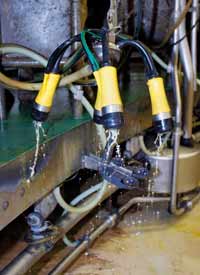Milk from cloned cow offspring ‘went down the drain’

Almost 100 pedigree dairy cattle have been born in Britain from the offspring of a cloned cow, Farmers Weekly can reveal. But any milk went down the drain, according to industry insiders.
Media attention is focusing on claims that British shoppers are unwittingly drinking “cloned cow milk” following reports quoting an unnamed farmer.
But farm leaders dismissed the notion that milk from the animals entered the food chain because the cattle are reared for breeding, not dairying.
At least 97 animals have been born to cattle reared from the imported embryos of a cow cloned in the USA, confirm documents seen by Farmers Weekly.
They include 96 cattle registered with the Holstein UK breed society by New Meadow Holsteins of Inverness, Scotland.
A further female animal was registered by BB Holsteins of Usk, Wales, according to the same breed society records.
Neither farm has proved willing to talk to the media about the situation. But both have spoken to Holstein UK spokesman Simon Gee.
Mr Gee said the animals were being reared for breeding purposes, rather than for milk.
Any milk had been disposed of into the slurry system and had not been sold for human consumption, he added.
“At no time has any milk gone into the food chain. The milk hasn’t gone into the milk tank. It hasn’t even been fed to calves.”
The cows had considerable value as breeding animals and were only milked so their performance could be classified.
Once thess data had been obtained, embryos from the cattle would be exported back across the Atlantic to North America, added Mr Gee.
“The value of the milk is negligible compared to the value of the animals as breeding stock,” he said.
It was important in terms of pedigree value that the animals were calved properly and then milked so they obtained the best classification.
In total, eight embryos were imported into the UK three years ago from the prize-winning American cow Vandyk-K Integ Paradise 2.
Four offspring from the embryos were subsequently been registered with Holstein UK, said Mr Gee. It was likely that the other four cattle had been culled or died.
Grahame Bulfield, former director of the Roslin Institute when Dolly the sheep was cloned, also doubted any milk had made it into the food chain.
“It is very difficult to evaluate this story, so it should be taken with a pinch of salt.”
The NFU, too, played down concerns.
There were no food safety risks posed by the products of offspring from cloned animals, said NFU policy director Martin Haworth.
“Public confidence is an absolute priority for our farmer members and as an industry we must be guided by consumer preference.”
Although the progeny of animals cloned abroad may be imported, these animals were easily identifiable and traceable in the food chain.
